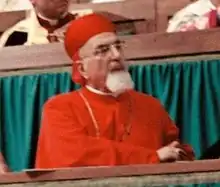Paul Peter Meouchi
Moran Mor Paul II Peter Meouchi (born April 1, 1894, Jezzine, Lebanon – died on January 11, 1975, Bkerké, Lebanon), (or Boulos Boutros el-Meouchi, Meoushi, Arabic: بولس الثاني بطرس المعوشي) was the 74th Maronite Patriarch of Antioch from 1955 until his death in 1975 and a cardinal of the Catholic Church.
Paul Peter Meouchi بولس الثاني بطرس المعوشي | |
|---|---|
| Cardinal Patriarch of Antioch | |
 | |
| Church | Maronite Church |
| See | Patriarch of Antioch |
| Elected | May 25, 1955 |
| Term ended | January 11, 1975 |
| Predecessor | Anthony Peter Arida |
| Successor | Anthony Peter Khoraish |
| Orders | |
| Ordination | December 7, 1917 (Priest) |
| Consecration | December 8, 1934 (Bishop) by Anthony Peter Arida |
| Created cardinal | February 22, 1965 by Pope Paul VI |
| Rank | Patriarch Cardinal-Bishop |
| Personal details | |
| Born | April 1, 1894 Jezzine, Lebanon |
| Died | January 11, 1975 (aged 80) Bkerké, Lebanon |
Life
Moran Mor Paul Peter Meouchi was born in Jezzine, Lebanon on April 1, 1894. His studied at the College de la Sagesse in Ashrafieh, a district of Beirut and later in Rome in the Pontifical Urban University and at the Pontifical Gregorian University.[1]
He was ordinated priest in Rome on December 7, 1917 and served as secretary of the Maronite bishops of Saida and of Tyre. After having attended a visitation of the bishop of Tyre in the United States in 1920, he remained in the United States till 1934, serving the Maronite communities particularly in Indiana, Connecticut and California.
He was elected Maronite bishop of Tyre on April 29, 1934 and consecrated on December 8, 1934 at Bkerké by Maronite Patriarch of Antioch, Anthony Peter Arida. His co-consecrators were Augustin Bostani, Eparch of Sidon, and Pierre Feghali, Titular bishop of Epiphania in Syria.[2] He chose as episcopal motto Gloria Libani data est ei.[1]
Moran Mor Paul Peter Meouchi was elected patriarch of Antioch of the Maronites on May 25, 1955. He attended the I, II and III sessions of the Second Vatican Council, 1962–1965, where he took a stand to defend the rights of Patriarchs to discourage the emigration of Christians from the Middle East.[3] On February 22, 1965 he was created Cardinal[4] by Pope Paul VI, being the first Maronite to become cardinal.[5] He was elevated - as usual of Eastern Catholic Patriarchs, as a result of the motu proprio Ad purpuratorum patrum collegium[6] - to the rank of cardinal-bishop without granting a suburbicarian diocese.
Paul Peter Meouchi was from 1969 until his death chairman of the Synod of the Maronite Church and from 1970 until his death chairman of the Assembly of Catholic Patriarchs and Bishops in Lebanon.
From a political point of view, his action as Patriarch of the Maronite was intended to promote the reconciliation among all the Lebanese, both Christians and Muslims. He was a supporter of the Arab nationalism, thus standing in opposition to the pro-USA former president of Lebanon Camille Chamoun.[3]
He died on January 11, 1975 in the Maronite Catholic Patriarchate in Bkerké, Lebanon, where he was buried.
Home Video of Patriarch Meouchi in Los Angeles 1962 on YouTube
See also
- List of Maronite Patriarchs
- Maronite Church
Sources
- Code, Joseph Bernard (1964). Dictionary of the American Hierarchy (1789-1964). New York: Joseph F. Wagner. pp. 200–201.
Notes
- Salvador Miranda. "Meouchi, Paul Pierre". The Cardinals of the Holy Roman Church. Retrieved 23 January 2011.
- "Pierre-Paul Cardinal Méouchi". Catholic-Hierarchy.org. David M. Cheney. Retrieved 23 January 2015.
- Domenico, Roy (2006). Encyclopedia of Modern Christian Politics. Westport: Greenwood Press. pp. 370–371. ISBN 978-0-313-32362-1.
- Pope Paul VI, with motu proprio Ad purpuratorum Patrum Collegium, published on 11 February 1965 ruled that the Patriarchs of the Eastern rite undertaken in the Sacred College of Cardinals did not belong to the clergy of Rome and, therefore, can not be assigned from there any title or diaconate. The Patriarchs cardinals belong to the order of cardinal bishops and, in the hierarchy, are located immediately after them. They maintain their patriarchal sees and are not assigned to them any suburbicarian sees.]
- "The Maronite Patriarchs". Kobayat. Retrieved 23 January 2011.
- w2.vatican.va